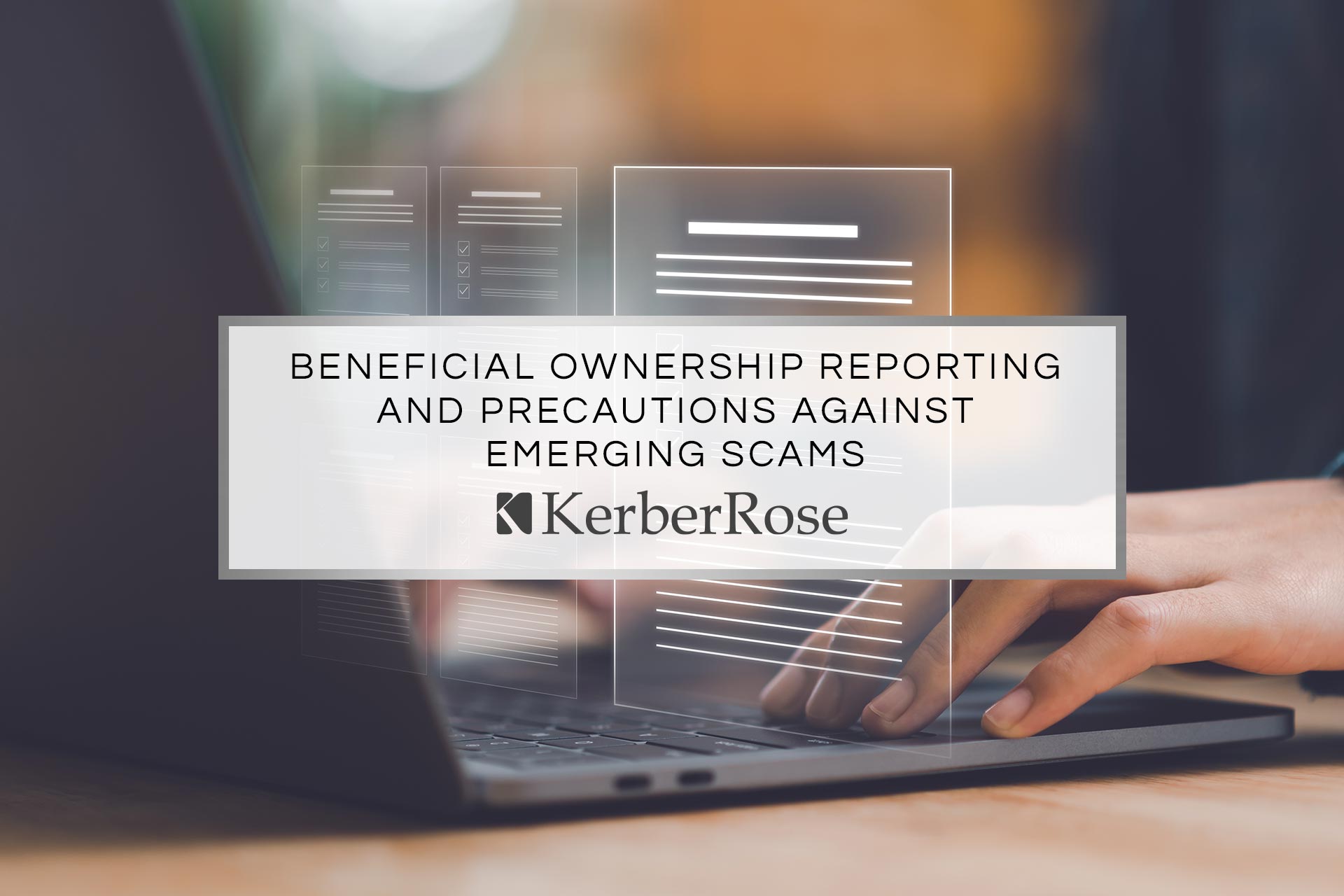Beneficial Ownership Reporting and Precautions Against Emerging Scams
As of January 1, 2024, the Corporate Transparency Act (CTA) came into effect, mandating the disclosure of beneficial ownership information (BOI) for certain entities. It is anticipated 32.6 million businesses will be required to comply with this reporting requirement. This critical legislation, enacted as part of the National Defense Act for Fiscal Year 2021, aims to combat money laundering, terrorism financing, and other illicit activities.
However, as businesses gear up for compliance, a new threat has emerged — scammers impersonating government officials, exploiting the BOI reporting requirements. This article contains preliminary information for you to consider as you approach the implementation period for this new reporting requirement, and ways to stay alert of potential fraud. This information is meant to be general only and should not be applied to your specific facts and circumstances without consultation with competent legal counsel or another retained professional adviser.
Entities Covered by the CTA
The reporting requirement extends to both domestic and foreign entities, including corporations, limited liability company’s (LLCs), and similar entities. Exemptions exist for certain categories, such as publicly traded companies, banks, credit unions, and tax-exempt entities. “Large operating entities” may also be exempt, provided they meet specific criteria related to employees, revenue, and physical presence in the U.S. To qualify for this exemption, the company must meet all of the following requirements:
- Employ more than 20 full-time equivalent people in the U.S.;
- Have reported gross revenue (or sales) of over $5 million on the prior year’s tax return; and
- Be physically present in the U.S.
Who is a Beneficial Owner?
A beneficial owner, under the CTA, is an individual who either exercises substantial control over a reporting company or owns/controls of at least 25% of its ownership interests. Detailed regulations further define terms such as “substantial control” and “ownership interest.”
The detailed CTA regulations define the terms “substantial control” and “ownership interest” further.
Reporting Timelines and Information Required
Entities have different filing timeframes based on formation dates or changes in beneficial ownership. New entities created in 2024 must file within 90 days, while those formed after December 31, 2024, must file within 30 days. Reporting companies with changes or inaccuracies must file within 30 days. Required information includes details about the reporting company, trade names, business address, and beneficial owners, along with their personal information and identification documents.
Risk of Non-Compliance
Non-compliance with BOI reporting may result in severe penalties, including criminal and civil fines of up to $10,000 per day and potential jail time. Understanding the reporting requirements and ensuring timely and accurate submissions is crucial for businesses to avoid these consequences.
Beware of Related Scams
Amidst the implementation of the CTA, scammers are exploiting the situation by sending official-looking letters to businesses, requesting BOI reporting through a fraudulent portal. Businesses should be vigilant and report any suspicious activity to the Better Business Bureau (BBB) scam tracker. Identifying scam letters involves checking the date, verifying the portal (using only FinCEN’s official website), and recognizing legitimate regulatory bodies like FinCEN. Here you can find an example of a fraudulent BOI reporting notice sent to a client of ours.
How Does the Scam Work?
Scammers are sending official-looking letters to businesses with a Notice ID and a website or QR code. Be cautious and vigilant! If you receive such a letter:
- Disregard the letter immediately.
- Report the incident to the Better Business Bureau (BBB) scam tracker using this link: BBB Scam Tracker.
How to Identify a Scam Letter
- Check the file-by date: Scam letters may show a deadline of 12/15/2023, while BOI reporting requirements only become effective on January 1, 2024.
- Verify the portal: The official portal for BOI reporting will be on the FinCEN website. Be cautious if directed elsewhere.
- Recognize the authority: The U.S. Business Regulations Department, as shown in our client example, is not a known entity. FinCEN, the Financial Crimes Enforcement Network, is the only legitimate regulatory body for reporting BOI, and FinCEN will not send unsolicited requests.
As businesses adapt to CTA reporting requirements, it is essential to stay informed about the legislation, comply with filing obligations, and remain vigilant against emerging scams. The CTA represents a crucial step in enhancing financial transparency and combating illicit activities — understanding its intricacies is key to ensuring both compliance and protection against potential threats.
Please refer to our 10 frequently asked questions document for further insight, or visit https://www.fincen.gov/boi for information regarding the Beneficial Ownership Information Reporting rule for details on specific provisions. Furthermore, any remaining questions can be directed to FinCENs contact site, or a Trusted Advisor is available to answer questions regarding your business situation.
Beneficial Ownership Reporting and Precautions Against Emerging Scams
As of January 1, 2024, the Corporate Transparency Act (CTA) came into effect, mandating the disclosure of beneficial ownership information (BOI) for certain entities. It is anticipated 32.6 million businesses will be required to comply with this reporting requirement. This critical legislation, enacted as part of the National Defense Act for Fiscal Year 2021, aims to combat money laundering, terrorism financing, and other illicit activities.
However, as businesses gear up for compliance, a new threat has emerged — scammers impersonating government officials, exploiting the BOI reporting requirements. This article contains preliminary information for you to consider as you approach the implementation period for this new reporting requirement, and ways to stay alert of potential fraud. This information is meant to be general only and should not be applied to your specific facts and circumstances without consultation with competent legal counsel or another retained professional adviser.
Entities Covered by the CTA
The reporting requirement extends to both domestic and foreign entities, including corporations, limited liability company’s (LLCs), and similar entities. Exemptions exist for certain categories, such as publicly traded companies, banks, credit unions, and tax-exempt entities. “Large operating entities” may also be exempt, provided they meet specific criteria related to employees, revenue, and physical presence in the U.S. To qualify for this exemption, the company must meet all of the following requirements:
- Employ more than 20 full-time equivalent people in the U.S.;
- Have reported gross revenue (or sales) of over $5 million on the prior year’s tax return; and
- Be physically present in the U.S.
Who is a Beneficial Owner?
A beneficial owner, under the CTA, is an individual who either exercises substantial control over a reporting company or owns/controls of at least 25% of its ownership interests. Detailed regulations further define terms such as “substantial control” and “ownership interest.”
The detailed CTA regulations define the terms “substantial control” and “ownership interest” further.
Reporting Timelines and Information Required
Entities have different filing timeframes based on formation dates or changes in beneficial ownership. New entities created in 2024 must file within 90 days, while those formed after December 31, 2024, must file within 30 days. Reporting companies with changes or inaccuracies must file within 30 days. Required information includes details about the reporting company, trade names, business address, and beneficial owners, along with their personal information and identification documents.
Risk of Non-Compliance
Non-compliance with BOI reporting may result in severe penalties, including criminal and civil fines of up to $10,000 per day and potential jail time. Understanding the reporting requirements and ensuring timely and accurate submissions is crucial for businesses to avoid these consequences.
Beware of Related Scams
Amidst the implementation of the CTA, scammers are exploiting the situation by sending official-looking letters to businesses, requesting BOI reporting through a fraudulent portal. Businesses should be vigilant and report any suspicious activity to the Better Business Bureau (BBB) scam tracker. Identifying scam letters involves checking the date, verifying the portal (using only FinCEN’s official website), and recognizing legitimate regulatory bodies like FinCEN. Here you can find an example of a fraudulent BOI reporting notice sent to a client of ours.
How Does the Scam Work?
Scammers are sending official-looking letters to businesses with a Notice ID and a website or QR code. Be cautious and vigilant! If you receive such a letter:
- Disregard the letter immediately.
- Report the incident to the Better Business Bureau (BBB) scam tracker using this link: BBB Scam Tracker.
How to Identify a Scam Letter
- Check the file-by date: Scam letters may show a deadline of 12/15/2023, while BOI reporting requirements only become effective on January 1, 2024.
- Verify the portal: The official portal for BOI reporting will be on the FinCEN website. Be cautious if directed elsewhere.
- Recognize the authority: The U.S. Business Regulations Department, as shown in our client example, is not a known entity. FinCEN, the Financial Crimes Enforcement Network, is the only legitimate regulatory body for reporting BOI, and FinCEN will not send unsolicited requests.
As businesses adapt to CTA reporting requirements, it is essential to stay informed about the legislation, comply with filing obligations, and remain vigilant against emerging scams. The CTA represents a crucial step in enhancing financial transparency and combating illicit activities — understanding its intricacies is key to ensuring both compliance and protection against potential threats.
Please refer to our 10 frequently asked questions document for further insight, or visit https://www.fincen.gov/boi for information regarding the Beneficial Ownership Information Reporting rule for details on specific provisions. Furthermore, any remaining questions can be directed to FinCENs contact site, or a Trusted Advisor is available to answer questions regarding your business situation.
Beneficial Ownership Reporting and Precautions Against Emerging Scams
As of January 1, 2024, the Corporate Transparency Act (CTA) came into effect, mandating the disclosure of beneficial ownership information (BOI) for certain entities. It is anticipated 32.6 million businesses will be required to comply with this reporting requirement. This critical legislation, enacted as part of the National Defense Act for Fiscal Year 2021, aims to combat money laundering, terrorism financing, and other illicit activities.
However, as businesses gear up for compliance, a new threat has emerged — scammers impersonating government officials, exploiting the BOI reporting requirements. This article contains preliminary information for you to consider as you approach the implementation period for this new reporting requirement, and ways to stay alert of potential fraud. This information is meant to be general only and should not be applied to your specific facts and circumstances without consultation with competent legal counsel or another retained professional adviser.
Entities Covered by the CTA
The reporting requirement extends to both domestic and foreign entities, including corporations, limited liability company’s (LLCs), and similar entities. Exemptions exist for certain categories, such as publicly traded companies, banks, credit unions, and tax-exempt entities. “Large operating entities” may also be exempt, provided they meet specific criteria related to employees, revenue, and physical presence in the U.S. To qualify for this exemption, the company must meet all of the following requirements:
- Employ more than 20 full-time equivalent people in the U.S.;
- Have reported gross revenue (or sales) of over $5 million on the prior year’s tax return; and
- Be physically present in the U.S.
Who is a Beneficial Owner?
A beneficial owner, under the CTA, is an individual who either exercises substantial control over a reporting company or owns/controls of at least 25% of its ownership interests. Detailed regulations further define terms such as “substantial control” and “ownership interest.”
The detailed CTA regulations define the terms “substantial control” and “ownership interest” further.
Reporting Timelines and Information Required
Entities have different filing timeframes based on formation dates or changes in beneficial ownership. New entities created in 2024 must file within 90 days, while those formed after December 31, 2024, must file within 30 days. Reporting companies with changes or inaccuracies must file within 30 days. Required information includes details about the reporting company, trade names, business address, and beneficial owners, along with their personal information and identification documents.
Risk of Non-Compliance
Non-compliance with BOI reporting may result in severe penalties, including criminal and civil fines of up to $10,000 per day and potential jail time. Understanding the reporting requirements and ensuring timely and accurate submissions is crucial for businesses to avoid these consequences.
Beware of Related Scams
Amidst the implementation of the CTA, scammers are exploiting the situation by sending official-looking letters to businesses, requesting BOI reporting through a fraudulent portal. Businesses should be vigilant and report any suspicious activity to the Better Business Bureau (BBB) scam tracker. Identifying scam letters involves checking the date, verifying the portal (using only FinCEN’s official website), and recognizing legitimate regulatory bodies like FinCEN. Here you can find an example of a fraudulent BOI reporting notice sent to a client of ours.
How Does the Scam Work?
Scammers are sending official-looking letters to businesses with a Notice ID and a website or QR code. Be cautious and vigilant! If you receive such a letter:
- Disregard the letter immediately.
- Report the incident to the Better Business Bureau (BBB) scam tracker using this link: BBB Scam Tracker.
How to Identify a Scam Letter
- Check the file-by date: Scam letters may show a deadline of 12/15/2023, while BOI reporting requirements only become effective on January 1, 2024.
- Verify the portal: The official portal for BOI reporting will be on the FinCEN website. Be cautious if directed elsewhere.
- Recognize the authority: The U.S. Business Regulations Department, as shown in our client example, is not a known entity. FinCEN, the Financial Crimes Enforcement Network, is the only legitimate regulatory body for reporting BOI, and FinCEN will not send unsolicited requests.
As businesses adapt to CTA reporting requirements, it is essential to stay informed about the legislation, comply with filing obligations, and remain vigilant against emerging scams. The CTA represents a crucial step in enhancing financial transparency and combating illicit activities — understanding its intricacies is key to ensuring both compliance and protection against potential threats.
Please refer to our 10 frequently asked questions document for further insight, or visit https://www.fincen.gov/boi for information regarding the Beneficial Ownership Information Reporting rule for details on specific provisions. Furthermore, any remaining questions can be directed to FinCENs contact site, or a Trusted Advisor is available to answer questions regarding your business situation.




